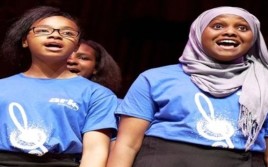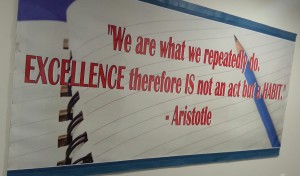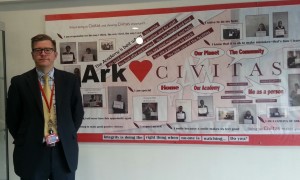Transcript
“The ethos is the genius of the institution, and Civitas is our ethos…”
“Civitas is something you can do to help someone else ‘s day – big or small. A small thing you can do is opening the door for someone or telling them there is something on their back, anything, just to help someone and make their day better than it was before.”
“We want the pupils to have a deep understanding of what it means to be a good person, a virtuous person, and by having a concept with tangible examples, which we ask them to consider and actually practise, it make it become much more real.”
“If only five out of ten people do it, it will make the school better, even that small bit. But the more people that do it, the better everyone’s day will get, and slowly the whole school will be a positive environment.”
This is a podcast about the role schools can play in developing ‘character’. In it Tess Woodcraft talks to Tim Dainty, Senior Vice Principal – Pupils & Inclusion at the Ark Academy in Wembley, where they are building, in their words, ‘a school of civic pride and social justice’ in which the development of character is an intrinsic part.
There’s been a bit of a brouhaha in the British press over the past few days after Richard Walden, chairman of the Independent schools Association claimed that state schools fail to provide their pupils with a ‘moral compass’. Then the general secretary of the Head Teachers Association responded that those who led us into the financial crash were mostly privately educated.
Actual research by Birmingham University suggests that neither state nor private schools are doing particularly well at engendering morality in their pupils. In a survey of year 10 children across dozens of private and state schools they found children seemed to be scoring lower on some traditional virtues, such as honesty and courage, than most of us would want to see.
So Tess Woodcraft went to the Ark Academy in North West London, to see what they are doing.
It is an imposing, newly built school, all glass and straight lines, standing almost in the shadow of Wembley Stadium with its iconic white arch. This is one of the poorest areas in the UK, and most of the pupils come from two estates with tough reputations.
The school calls its approach ‘Civitas’ – so Tess asked Senior Vice Principal Tim Dainty what exactly is Civitas?
Tim Dainty: We don’t even pronounce it in the way Latin scholars would pronounce it (which would be Kiwitas or Kivitas), we pronounce it Civitas (sivitas)and that speaks volumes because it is very much our own word, our own concept and idea. It means a lot more than its original meaning of citizenship. It means kindness, altruism, being kind, being considerate.
Tess Woodcraft: How did you come up with it?
TD: It was the Principal’s notion. She was a serving head teacher in East London in a Catholic girls’ school and she developed her own concept of ‘Serviam’ and it was very powerful and she saw, through her own headship, children take ownership and it give real meaning and meat to virtue and character. We transferred it over and realised how important it was.
The pupils have made it their own, they have directed us in how we use it. Initially it was just a noun, a thing, an idea, a concept, but now it’s an adjective. They say things like, ‘that was very civitas!’
Jai: They don’t tell you why you should be civitas, because we all understand. It is not that they are trying to make you be civitas for your own benefit.
TD: That idea was central to our Civitas campaign. All pupils were asked to write down on whiteboards examples of civitas behaviour and we took photographs and it was included in the Civitas Magazine (which is edited by pupils) and they had ownership of it. It made them think about the little details, like leaving their plates in the dining room or not picking up litter when they see it. They were challenged to question their own behaviours and not do things unthinkingly – because essentially it is all about being thoughtful.
TW: What difference has it made to the life of the school?
TD: Because it’s a living concept. It’s not just about rules, consequences and rewards. We speak about being good and developing character. We don’t just talk about ‘you’ve broken this rule, here is this consequence.’ A rule is aways tied with character, it’s always tied with being thoughtful. We don’t want children to leave this school doing the right thing because they like rewards or they don’t want consequences, that’s just part of the process.
We want them to have a deep understanding of what it means to be a good person, a virtuous person, and by having a concept with tangible examples which we ask them to consider and actually practise – like holding doors open for one another, like standing up when adults come into the classroom, like saying good morning, thank you, like writing letters to your teachers to show gratitude about the thing s they’ve done to help them – it makes it become much more real, you have to practise it.
TW: But, I wondered, how deep does this commitment to fairness go when the chips are down and there are financial costs…..
TD: Civitas comes down to everything, even the infrastructure. We are building a community. We expect everyone to buy into that – from the cleaners to the chef, to the catering staff. None of them are outsourced, they are are all employed directly by the school, all on a London Living Wage and they all come to our end of term celebrations where we have food and celebrate the achievemnts o the term and theyear. There is that sense of pride and that’s why the place is so clean, and why – as you are about to find out – the food is so amazing. It costs a lot of money, but the return is huge!
TW: I can confirm that lunch was really delicious. As I sat down to chat over a chicken salad with some year 10 pupils, they told me what Civitas means for them….
Kiera: Civitas is very important because it is the foundation of the school and it shapes how we talk to each other in class and out of class. It affects everything we do, it is important to us, it’s more than being a citizen, it’s being a kind and a good person.
Dave: The Civitas programme is important because it gives a sense of purpose; at the school, as well as our academics. It gives us something that links us all together and helps us be a community environment.
TW: How doyou convey the concepts – what is the process?
TD: First of all we have to induct our children, and we do something quite unusual – we make sure Year 7 pupils (the first year in secondary school) are in for the first week of the academic year, when no one else is on site. That is when we et the chance to win their hearts and minds.
A central idea in the school is that there is no limit to one’s growth. We interview all parents, and meet all the children before they come to our school. They come for a day, and we have a parents’ information evening where we talk about our beliefs, because we want them to share our passions and beliefs.
TW: Some might say this is the role of parents and home….
TD: But isn’t it wonderful to have a language . I’m a parent myself and I know that being a parent is a challenging job, the most difficult job going. But if you’ve got a shared common language, it helps build not only the child as the child grows, but it also builds a bond and a link between the children , te school and the parents. So te parents talk to us about their ‘civitas behaviour’ and their children’s civitas behaviour, and vice versa. It gives meaning.
TW: The goal of the Ark Academy is that all students should be able to access higher education and participate fully in our democratic society. Does Civitas play a role in that?
TD: We don’t talk about ability, intelligence or potential because these are all labels. We talk about progress, character strengths (not character traits) and we talk about what it means and what it looks like.
And we give one another feedback. Pupils give teachers feedback about their lessons, and we give pupils feedback. We want them to be able to deal with feedback and not be defensive about it, but see it as a ticket to become a beter learner and a better person.
TW: And as Tim Dainty pointed out, there is a growing recognition of the importance of character development
TD: It is a bit of a hot ticked at the moment, character development. But any decent school has been talking about character for years. The word may go in and out of favour, but ultimately it is vital, whether it be in extra curricular activities, PSHE lessons, history lessons – whatever it is – we should be developing character.
There is psychological research by people like Seligman, who suggests that persistence and patience, which are part of Civitas, are actually a crucial ingredient for success. And when he talks about success he means flourishing, not just achievement but being a good person and having a sense of purpose and wellbeing and happiness, and that’s what we want to develop in our pupils.
Jai: I think it makes a difference from a normal school where they are just focused on the learning (which is obviously important and why we’re here), but without the civitas side it would just be focusing all your efforts on trying to get the best grades and while that is important it’s not the only thing that matters in life and you won’t get anywhere in your life if you’re not a nice person, and you can’t work with people. So it allows us to focus on both sides.
TW:And just in case you were wondering if all this focus on character detracts from aspiration and achievement, I asked the year 10 pupil I spoke to over lunch what they wanted to be when they left school…….
I want to be the head of a marketing or advertising agency
I don’t know what I want to be, so I ‘m keeping my options open
I want to be a cardio-thoracic surgeon
I want to be an investment banker
I’d like to work for the BBC…….
Tags: Ark Academy, Character development, Citizenship, Schooling





Subscribe with…